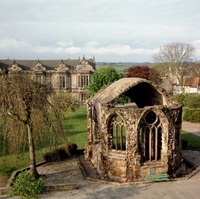Blackfriars
Blackfriars
The ruins at Blackfriars are all that remain of St Andrews' Dominican friary. The Dominicans (also known as the Black Friars because of the colour of their cloaks) are a Catholic religious order founded in France in the thirteenth century. They were particularly committed to preaching, education, and combating heresy. It is not clear when Dominican friars first settled in St Andrews, but they were well-established in the city by the late fifteenth century. The friars undertook major building work during the early sixteenth century, and the surviving ruined chapel is probably part of an extension to the friary church built in 1549. Only ten years later, in 1559, the friary was sacked by Protestant Reformers, the friars driven out, and the buildings partially demolished.
Richard Fawcett on the Blackfriars church
Elizabeth Rhodes on the history of the Dominican Friary
Katie Stevenson on Walter Bower
Michael Brown on John Knox's account of the execution of Patrick Hamilton
Street View
Additional Information
Location: On the south side of South Street. Date Built: Late fifteenth and early sixteenth centuries.
Dominican friaries in Cupar and St Monans were closed down in order to provide funds for the St Andrews friary.
Cardinal David Beaton (d.1546) may have been buried in the friary church.
In the sixteenth century there was a garden behind the friary where the friars could grow fruit and vegetables. The garden was probably about where the buildings of Madras School now stand.
The St Andrews Dominicans had an extensive library including classical texts and works by the latest European theologians. Some of these books have survived and are now in Aberdeen University Library.
Following the Reformation, the friars were forced to convert to Protestantism. In March 1560 in St Andrews parish church, John Grierson (the head of the Dominican order in Scotland and former prior of the St Andrews Black Friars) publicly rejected the pope, the mass, and all "ungodly opinions and inventions".
